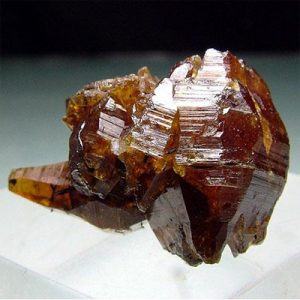Parisite
Parisite was named for J.J. Paris, former manager of the Muzo emerald mine, Muzo, Columbia. The chemical formula of Parisite is Ca(Ce, La)2(CO3)3F2 (Calcium Cerium Lanthanum Carbonate Fluoride) and its molecular weight is 537.24 gms. Parisite is one of a few rare earth carbonate minerals that also includes Bastnäsite and Burbankite. Parisite contains cerium and lanthanum in its chemical formula. When coming to crystal habit of Parisite Steep doubly-terminated pyramidal crystals, to 24 cm; many forms, but oscillatory and sceptred due to intergrowths with Bastnasite-(Ce), synchysite-(Ce), rontgenite-(Ce), cordylite. Parisite is a very rare gem and usually very small due to lack of large, clean crystals.
Distribution: Many localities, most minor. Fine crystals from the Muzo district, Boyacá Province, Colombia. In the USA, in Montana, very large crystals at the Snowbird deposit and the nearby Cedar Log prospect, Mineral County, and from Pyrites, 13 km east of Florence, Ravalli County; at Quincy, Norfolk Co., Massachusetts. From Mont Saint-Hilaire, Quebec, Canada. At Holmestrand, Vestfold, Norway. In the Trimouns talc deposit, six km northeast of Luzenac, Ariege, France. From Monterfano, Lombardy, Italy. Around Gallt y Wenallt, Gwynedd, Wales. In the Khibiny massif, Kola Peninsula, Russia. On Mt. Malosa, Zomba district, Malawi. At Ifasina, Torendrika, Madagascar. In the Lueshe carbonatite, 150 km north of Goma, Kivu Province, Congo (Zaire). At the Shiraishi pegmatite, Kobe, Kyoto Prefecture, Japan. In the Bayan Obo Fe–Nb–RE deposit, 130 km north of Baotou, Inner Mongolia, China. At Nam Nam Xe, Vietnam.
| Chemical Formula: | Ca(Ce,La)2(CO3)3F2 |
| Calcium Cerium Lanthanum Carbonate Fluoride | |
| Molecular Weight: | 537.24 gm |
| Composition: | Calcium | 7.46 % | Ca | 10.44 % | CaO |
| Lanthanum | 23.27 % | La | 27.29 % | La2O3 | |
| Cerium | 28.69 % | Ce | 33.60 % | Ce2O3 | |
| Carbon | 6.71 % | C | 24.58 % | CO2 | |
| Oxygen | 26.80 % | O | |||
| Fluorine | 7.07 % | F | 7.07 % | F | |
| – % | F | -2.98 % | -O=F2 | ||
| 100.00 % | 100.00 % | = TOTAL OXIDE | |||
| Crystallography: | Trigonal – Pyramidal (Monoclinic – Pseudohexagonal) |
| Crystal Habit: | Steep doubly-terminated pyramidal crystals, to 24 cm; many forms, but oscillatory and sceptred due to intergrowths with Bastnasite-(Ce), synchysite-(Ce), rontgenite-(Ce), cordylite. |
| Twinning: | None |
| Cleavage: | Distinct on {0001} |
| Fracture: | Splintery to Sub-Conchoidal |
| Tenacity: | Brittle |
| Moh’s Hardness: | 4.5 |
| Density: | 4.33 – 4.39 (g/cm3) |
| Luminescence: | Non-fluorescent; may exhibit dark red cathodoluminescence |
| Radioactivity: | Weak; GRapi = 50,156.22 (Gamma Ray American Petroleum Institute Units) |
| Other: | Soluble in hot strong acids. |
| Color: | Brownish yellow, orange, orange-brown, brown, wax-yellow, grayish yellow, lilac; colorless to yellow in transmitted light |
| Transparency: | Transparent to translucent |
| Luster: | Vitreous to resinous, pearly on {0001} parting |
| Refractive Index: | 1.676 – 1.757 Uniaxial ( + ) |
| Birefringence: | 0.0810 |
| Dispersion: | n/a |
| Pleochroism: | Weak; O = Light yellow, E = Golden yellow |


